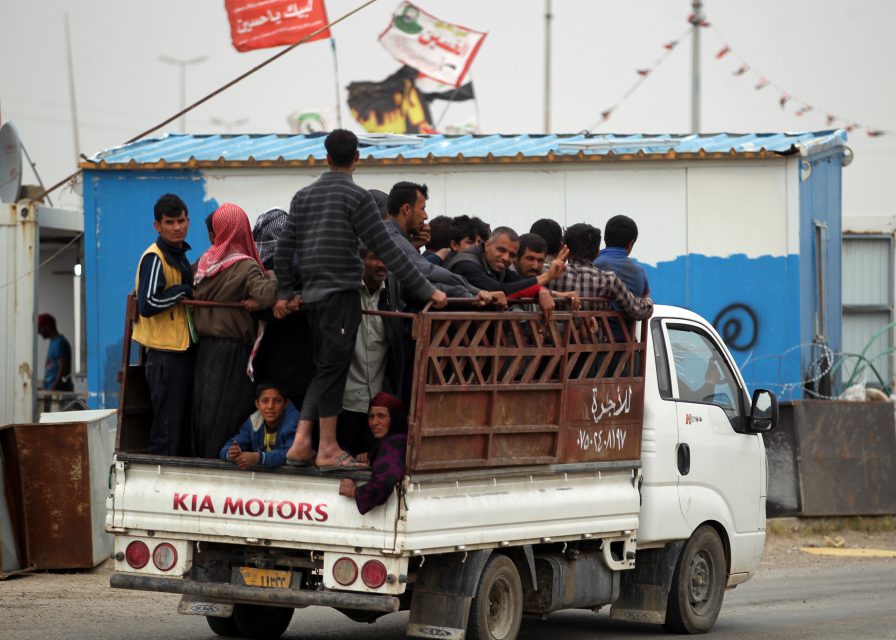
by Maya Gebeily
Agence France-Presse
BEIRUT, Lebanon -A jihadist assault led by suicide bombers killed dozens Tuesday at a camp for the displaced near Syria’s border with Iraq, as pressure grows on the Islamic State group in both countries.
The violence left at least 38 people dead and came as another surprise IS attack on Tuesday killed 10 soldiers in Iraq, to the south along the border.
The jihadist group appears to be lashing out as it faces escalating offensives on its last two major bastions: second city Mosul in Iraq and Raqa in neighbouring Syria.
IS’s dawn attack in Syria’s northeast hit a makeshift camp near the border with Iraq where some 300 families were waiting to cross into territory held by the Syrian Democratic Forces, the US-backed alliance leading the assault on Raqa.
The Syrian Observatory for Human Rights, a monitoring group, said at least five suicide bombers blew themselves up inside and outside the camp in Hasakeh province which hosts Syrians and Iraqis forced from their homes.
Heavy clashes then erupted between the IS fighters and the SDF near the camp, which lies just inside Syrian territory, Observatory head Rami Abdel Rahman told AFP.
He said at least 38 people had been killed including 23 displaced Syrians or Iraqi refugees.
“At least 30 people were wounded, and the death toll may rise because some people are in critical condition and others are still unaccounted for,” the Britain-based monitor said.
IS claimed the attack via its propaganda outlet Amaq, saying a groups of jihadists attacked an SDF position near the camp as part of a multi-pronged assault on the group.
‘Appalled, saddened’
Kamal Derbas, a press officer for the Kurdish Red Crescent, said the attack began at 4:00 am (0100 GMT) and put the civilian death toll at 22.
Thousands of people — from the Syrian province of Deir Ezzor further south and from the Iraqi city of Mosul across the border — have used the crossing to reach safety, according to the International Rescue Committee.
“We are appalled and saddened to hear of the attacks today in Hasakeh province,” said IRC regional advocacy adviser Thomas Garofalo.
Conditions in the area are harsh, with little shelter, the authorities overstretched, and the risk of renewed violence.
The other IS attack in Iraq saw jihadists fire on an army base near the remote outpost of Rutba, near the country’s western borders with Syria and Jordan.
An Iraqi army lieutenant colonel said IS jihadists fired mortar rounds and rockets at the 1st Division base in the Saggar area, east of Rutba, before trying to storm it.
IS appeared to be trying to breach the defence of Rutba, which is the last sizeable town on the road from Baghdad to the Jordanian border, as well as to create diversions to ease pressure on its fighters in Mosul, military officials said.
A massive offensive was launched in mid-October to retake Mosul, where IS head Abu Bakr al-Baghdadi declared the establishment of IS’s so-called “caliphate” nearly three years ago.
‘Violent’ Tabqa clashes
IS once controlled swathes of land on both sides of the Iraqi-Syrian border, but US-backed offensives have seen much of that territory retaken.
A US-led coalition began bombing IS positions in Iraq in August 2014 and launched raids against the jihadists in neighbouring Syria the following month.
In northern Syria, the coalition is backing the major assault by the SDF — an alliance of Arab and Kurdish fighters — on Raqa.
A key waypost in that offensive is the city of Tabqa, which lies along the Euphrates River and on an IS supply route about 55 kilometres (35 miles) west of Raqa.
On Tuesday, the SDF was locked in “very violent clashes” with IS in a northern district of Tabqa, the last section of the city still held by the jihadists, the SDF said in a statement.
SDF fighters managed to seize a tank and several vehicles used by IS, it said.
More than 80 percent of Tabqa is now in SDF hands, just eight days after the group first entered the city.
More than 320,000 people have been killed in Syria since the country’s conflict began in March 2011 with anti-government protests.








